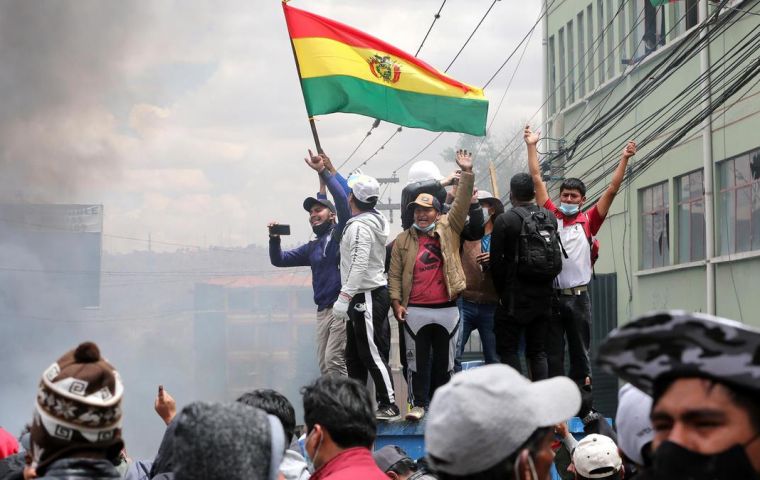MercoPress. South Atlantic News Agency
Demonstrators stage anti-gov't protests in Bolivia; Arce, Evo speak of “failed coup”
 Demonstrators opposed a bill whereby the government would be able to investigate the assets of any citizen without a court order
Demonstrators opposed a bill whereby the government would be able to investigate the assets of any citizen without a court order Opposition demonstrators in Bolivia staged over the weekend a series of roadblocks and marches to protest against the Government of President Luis Arce's move to pass a law allowing for in-depth investigations into the personal wealth of citizens.
The protesters opposed the Government's so-called Law Against the Legitimization of Illicit Profits, Financing Against Terrorism and Financing of the Proliferation of Weapons of Mass Destruction.
Bolivian Police had to use teargas to guarantee “free movement,” which was supported in some cases by civilians who said they were against the protest.
The main demonstrations took place in Santa Cruz, La Paz and Cochabamba, which make up the “central axis” of the country. Other gatherings were reported to have taken place at Oruro, Potosí, Tarija and Sucre.
Santa Cruz was the epicentre of the protests since early in the morning due to the absence of unionized public transport in addition to the fact that many businesses closed their doors in support of the Civic Committee's call.
Demonstrators feared such a law would give special powers at the request of the State to carry out political persecution in violation of confidentiality or professional secrecy clauses.
Protesters placed ropes, tires and other objects at street crossings to stop circulation.
The president of the Santa Cruz Civic Committee, Rómulo Calvo, highlighted the support the strike had received in that region, while Public Works Minister Édgar Montaño, personally removed tires that blocked roads and urged the population to clear the way.
In La Paz, the Police used tear gas to disperse people who even made a barrier by joining their arms and sat in the streets to halt traffic. City Council Speaker Jorge Dulón even warned about the presence of alleged “paramilitary groups” of the ruling Movement for Socialism (MAS) might support the Police to guarantee “free movement”.
In Cochabamba, a massive march by unions and informal traders crossed the city centre. “We are in this civic strike telling the MAS that through laws it is not going to impose the dictatorship,” activist Lizeth Beramendi from a blockade in a city where tension peaked easily.
The Bolivian government had from the beginning minimized the announcement of the strike and called it a manoeuvre to destabilize Arce's administration. Former President Evo Morales even said the strike had “failed” and the Bolivian people “do not want to be an accessory to the coup, they defend democracy” and “do not want to harm the economy.”
A few arrests have also been reported. Police Chief Jhonny Aguilera acknowledged that in “Cochabamba and Santa Cruz” there were “sporadic blockades that are being monitored”, while the Minister of Government (Interior) assured that in the rest of the seven departments “there is absolute normality.”
In the three cities, public transportation was meagre, although private banking and public administration operated normally.
“The undemocratic conspiracy has not been definitively defeated with last year's elections. It raises its head again, promoting riots and disunity among Bolivians, to create the conditions for a new coup,” Arce said.
Arce, who won the elections with 55% of the votes in favour, called on the peoples of the world “to be alert because the struggle of one people is the struggle of all the peoples.” The ruling party has repeatedly denounced being a victim of destabilizing efforts.
The criticized bill, which is discussed by the ruling majority Parliament, would allow the government to investigate the assets of any citizen without a court order and would force lawyers and journalists to reveal client information, among other aspects.
The protesters also denounced a “political persecution”, due to the criminal trials that are being carried out against former interim right-wing President Jeanine Áñez (2019-2020); the mayors of La Paz, Iván Arias, and of Cochabamba, Manfred Reyes Villa; the governor of Santa Cruz, Luis Fernando Camacho; as well as former presidents Carlos Mesa (2003-2005) and Jorge Quiroga (2001-2002).




Top Comments
Disclaimer & comment rulesCommenting for this story is now closed.
If you have a Facebook account, become a fan and comment on our Facebook Page!